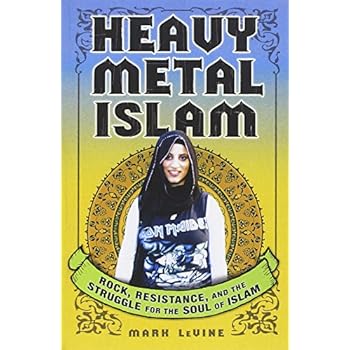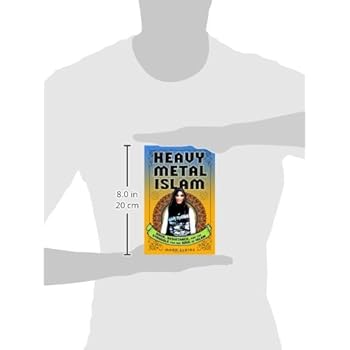Heavy Metal Islam: Rock, Resistance, and the Struggle for the Soul of Islam
Category: Books,Arts & Photography,Music
Heavy Metal Islam: Rock, Resistance, and the Struggle for the Soul of Islam Details
From Publishers Weekly Starred Review. With a jolting arrangement of images and voices, LeVine powerfully upends received notions about the Middle East by exploring one of the area's least-known subcultures. Interviewing and jamming with musicians from Morocco to Pakistan—including rappers and trip-hop artists as well as metalheads—LeVine (Why They Don't Hate Us) presents Muslims, Christians and Jews who, in the face of corruption, repression and violence, use their music to speak truth to power and carve out a space for individual expression and a new form of community. The degree of independence the musicians enjoy varies widely—from Israeli band Orphaned Land who are free of restrictions (and widely admired in the Arab metal world) to Egyptian metalheads who fear arrest and possible torture for sporting long hair. Each artist in this book struggles, on some level, for cultural and political reform, and LeVine argues that if these musicians could find a way to cooperate with progressive religious activists and the working class, they could trigger a revolution. This is a tall order, but the author's warm and intelligent examination of a reality few in the West have experienced suggests it may yet be possible. (July 15) Copyright © Reed Business Information, a division of Reed Elsevier Inc. All rights reserved. Read more From School Library Journal Adult/High School—In the 1970s, heavy metal acts like Black Sabbath and Iron Maiden created dark, violent music that was as much political and social protest as it was adrenaline-laced sound energizing the mosh pit. LeVine looks at the current heavy metal, punk, and hip-hop scenes of the Middle East in this way, presenting the backgrounds of each and exploring the social import of their messages. With lyrics crying for political and social change, this music carries the screams of angry youth, but angry youth who, for the most part, still regard themselves as devout Muslims. Each chapter examines a different nation and its music scene. Although it's not surprising that the most active centers are the more Westernized nations like Morocco and Israel, the most fascinating sections are those that cover places like Iran, where the music is not just looked at with suspicion, but often considered illegal. Many of the musicians are in their late teens and early 20s. Unfortunately, LeVine does a poor job of describing the music itself, throwing out terms like "grindcore" and "black metal" without defining them. Readers already knowledgeable about different forms of heavy metal won't have a problem with this, but those coming from the outside might find all the undefined labels a little confusing. LeVine does, however, provide a useful list of Web sites that provide samples of the music; a companion audio CD is sold separately. It becomes obvious that the author sees these musicians as a force for positive change. Although a journalistic approach might make this work more convincing, it's still a fascinating read about a unique subculture.—Matthew L. Moffett, Pohick Regional Library, Burke, VA Copyright © Reed Business Information, a division of Reed Elsevier Inc. All rights reserved. Read more Review “Offers the hit-and-run pleasures of a lively road trip…. Levine manages to unpack enough cross-cultural incongruities to mount his own mosh pit follow-up to ‘You Don’t Mess With the Zohan….informative, valuable, and moderately mad.”—The New York Times Book Review“A fascinating social phenomenon….[LeVine’s] material is rich, as he mingles scenes of conflict with surprising moments of understanding.”—Los Angeles Times“There's something irresistible about the idea that LeVine… not only interviewed rock and rap artists from all over the Middle East and North Africa but also put down the notepad and got up onstage to jam with them."—Slate.com “A deeply felt, informed volume that’s both hopeful and emotionally honest…LeVine does a remarkable job, sketching not only the surprising realities of the musicians, but also providing excellent historical background and terrific detail….anyone–regardless of musical preference–who wants an eye-level glimpse into the Middle East should pick up Heavy Metal Islam."—Paste magazine“With a jolting arrangement of images and voices, LeVine powerfully upends received notions about the Middle East by exploring one of the area's least-known subcultures…. LeVine argues that if these musicians could find a way to cooperate with progressive religious activists and the working class, they could trigger a revolution. This is a tall order, but the author's warm and intelligent examination of a reality few in the West have experienced suggests it may yet be possible.” —Publishers Weekly (starred review)“Alternately inspiring and disheartening—a solid work of cross-cultural analysis.”—Kirkus Reviews“Using music as a prism to observe social relations, he expertly describes the political upheaval and social confusion in the Middle East that Westerners ignore or seldom understand. This examination of the changing and evolving cultures in a key global region is highly recommended.”—Library Journal“Heavy Metal Islam is a fun read, and an important one. As an American, Islam has been portrayed as the boogie man. I don't know much about the culture or musical influences. As a musician I can relate to the struggles [of] trying to write and record songs and the difficulty of finding hard rock records where they don't exist. So this was a pleasant surprise that these young artists and fans from such a different culture can enjoy the same soundtrack of my youth. I guess Lemmy is God in all languages.”—Gilby Clarke, former guitarist for Guns N’ Roses and star of the hit TV reality show, Rock Star Supernova Read more About the Author Mark LeVine is a musician who has recorded and toured with acclaimed performers, including Mick Jagger, Dr. John, Ozomatli, and Hassan Hakmoun. He is also a professor of Middle Eastern history at the University of California–Irvine and holds a doctorate in Middle Eastern history and Islamic studies. Read more

Reviews
Interesting book covering a topic that's not really covered, and that is the rock and rap subculture in predominately Muslim Middle East and North African (MENA) countries. The author speaks about six languages (including Arabic and Hebrew) so he gets around pretty well. One item he mentioned that I found interesting is that the Arabic spoken in Morocco is very different from the Arabic spoken in other parts of MENA, so much so that Arabic speakers in Syria (for example) couldn't understand the Arabic spoken in Morocco (and vise versa). Moroccan Arabic has a lot of Berber and other non-Arabic (such as French and Spanish) words embedded in the language. The author writes about his own personal experiences traveling in various MENA countries. He's particular to rock music because he's a rock guitarist himself, and has played with various bands located in the countries he writes about. His book is a sociology book about a subculture existing in MENA, and the social problems and tensions that he's observed (especially concerning rockers and rappers in those countries he visited). If you want to read about the rock and rap subculture in these countries, then this book is probably a pretty good book to read. He didn't really write much about the various terrorist organizations operating in MENA (organizations such as the Sunni terrorist organization Muslim Brotherhood which had ties to Nazi Germany back in the 1930s and 1940s and which has supported or spawned other terrorist groups such as Hamas, Al Queda, and ISIS). I have a feeling ISIS (for example) would probably have little (or no) tolerance for the rockers and rappers, Jews, and other people not following their radical Islamic philosophy (including the author) and would probably execute them if they caught them (beheading being a common execution method). If you want to read about the overall socio-economic problems and the history of MENA, then I'd recommend books by Bernard Lewis, or James Gelvin or Huston Smith (for detailed info on religions such as Islam, Judaism, Christianity, etc) or Lord Kinross (on Ottoman history), and others. The author of this book tends to have a liberal leftist (moving in the Cultural Marxist direction) slant to his writings, and his writings are not as balanced as other writers of MENA history and culture. But again, if you just want to read about the rock and rap subculture existing in MENA, then this book is a good book to read for that.




